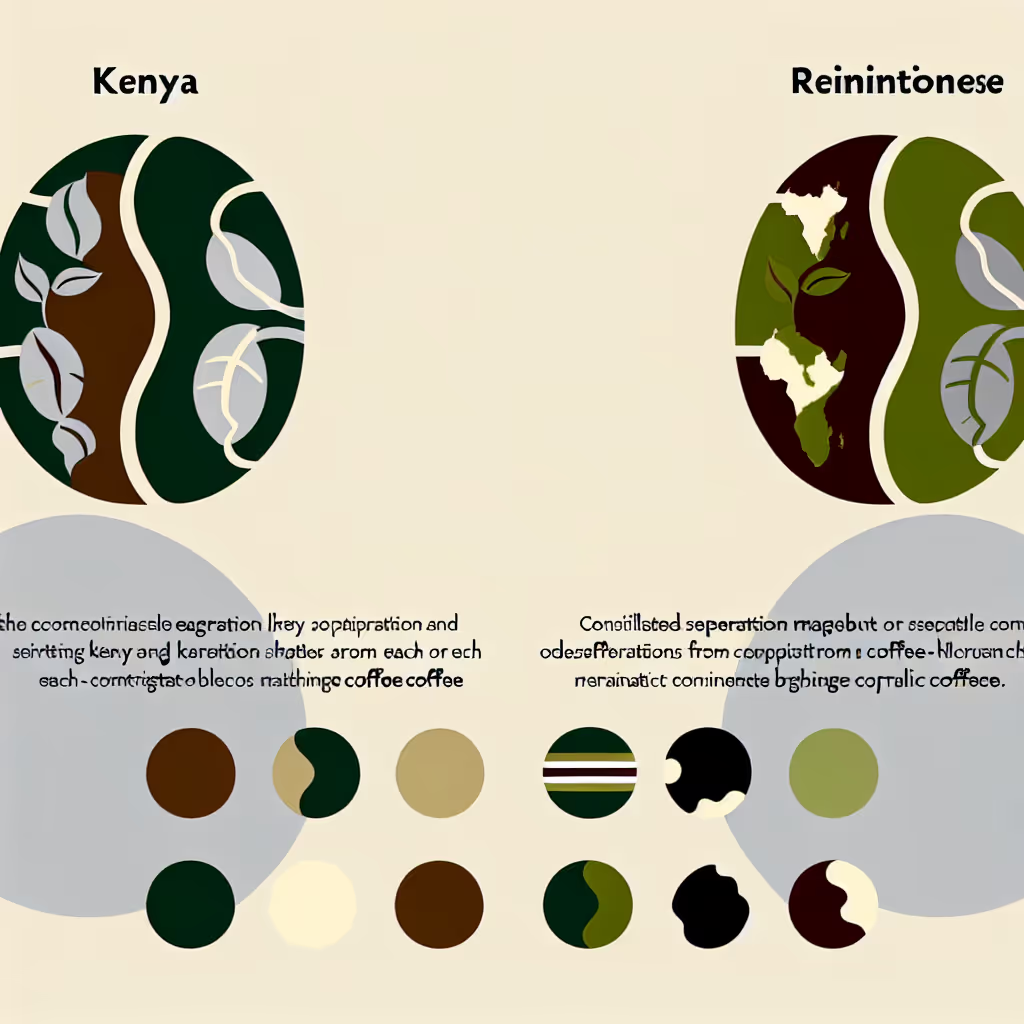Kenyan Vs. Yemeni Coffee
This comparison explores the distinct qualities of Kenyan and Yemeni coffee, highlighting their unique flavor profiles, growing conditions, and cultural significance in the world of specialty coffee.

Brief Description
Kenyan coffee is renowned for its bright acidity, full body, and complex flavor profile. Grown in the rich volcanic soils of the Central Highlands, these beans benefit from ideal climate conditions and meticulous processing. The result is a cup that's bold, wine-like, and often described as the 'connoisseur's choice'. With notes ranging from blackcurrant to citrus, Kenyan coffee offers a truly unique and memorable tasting experience.
Yemeni coffee is a true gem in the world of specialty coffee, known for its rich history and unique flavor profile. Grown in the ancient terraced gardens of the Haraz Mountains, these beans are cultivated using traditional methods passed down through generations. The harsh growing conditions and natural processing contribute to a complex, wine-like acidity and a distinctive wild, fruity character that sets Yemeni coffee apart from other origins.
Importance of Comparison
Comparing Kenyan and Yemeni coffee is crucial for coffee enthusiasts seeking to expand their palate and understand the diversity of single-origin beans. These two origins represent vastly different coffee-growing regions, each with its own terroir, processing methods, and flavor characteristics. By exploring their differences, coffee lovers can make informed decisions about their purchases and brewing preferences.
Key Attributes
Origin
Kenyan
Yemeni


Consumer Guide
When choosing between Kenyan and Yemeni coffee, consider your flavor preferences. Kenyan coffee offers bright acidity with notes of blackcurrant and citrus, ideal for those who enjoy a bold, complex cup. Yemeni coffee, with its wild berry and chocolate notes, appeals to those seeking a unique, rustic flavor profile. For brewing, both excel in pour-over and French press methods. Kenyan beans are great for cold brew, while Yemeni coffee shines in traditional Ibrik preparation. Consider the processing methods: Kenyan coffee's washed process results in a cleaner taste, while Yemeni's natural process offers a more intense, fruity flavor. Lastly, think about availability and price, as Yemeni coffee is often rarer and more expensive due to limited production.
Expert Opinions
Coffee expert James Hoffmann notes, 'Kenyan coffee represents the pinnacle of washed processing, offering unparalleled clarity and brightness.' On Yemeni coffee, specialty roaster Mokhtar Alkhanshali states, 'Yemen's coffee has a wild, untamed character that's truly unique in the coffee world.' Both experts agree that these origins offer exceptional quality, with Kenyan beans praised for their consistency and Yemeni for their rarity and historical significance.
FAQs
Kenyan coffee is known for its bright acidity, with flavors of blackcurrant, citrus, and floral notes. Yemeni coffee offers a more rustic profile with wild berry, chocolate, and spice notes. Kenyan coffee tends to be cleaner and more consistent, while Yemeni coffee has a more complex, wine-like acidity and wild character.
Kenyan coffee is grown in the Central Highlands at altitudes of 1400-2100m, in rich volcanic soil with ideal climate conditions. Yemeni coffee is cultivated in ancient terraced gardens in the Haraz Mountains at 1500-2500m, under harsh, arid conditions. These differences in terroir contribute significantly to the distinct flavor profiles of each origin.
Both Kenyan and Yemeni coffees excel in pour-over and French press methods. Kenyan coffee is also great for cold brew due to its bright acidity. Yemeni coffee shines in traditional Ibrik (Cezve) preparation, which highlights its unique, rustic flavors. Experiment with different methods to find your preferred way of enjoying these distinctive beans.
Kenyan coffee typically undergoes washed processing, including double fermentation and sun-drying, resulting in a clean, bright flavor profile. Yemeni coffee is traditionally processed using the natural (dry) method, where cherries are sun-dried before hulling. This contributes to Yemeni coffee's more intense, fruity flavors and complex acidity.
Kenya produces significantly more coffee annually, with about 50,000 metric tons compared to Yemen's 20,000 metric tons. This difference in production volume affects availability and pricing, with Yemeni coffee often being rarer and more expensive in the specialty coffee market.
While Kenyan coffee has a shorter history, dating back to the early 20th century, it quickly gained recognition for its exceptional quality. Yemeni coffee has a rich history spanning centuries, with Yemen being one of the first countries to cultivate and export coffee. The Port of Mokha in Yemen was once the world's primary coffee trading hub, giving Yemeni coffee significant historical and cultural importance in the coffee world.
Conclusion
Both Kenyan and Yemeni coffees offer unique and exceptional experiences for coffee enthusiasts. Kenyan coffee stands out for its bright acidity, consistent quality, and complex flavor profile, making it a favorite among specialty coffee lovers. Yemeni coffee, with its rich history and distinctive wild character, provides a truly unique tasting experience. While Kenyan coffee is more widely available and versatile in brewing methods, Yemeni coffee offers a rare glimpse into coffee's origins. Ultimately, the choice between these two remarkable origins comes down to personal preference and the desire to explore the diverse world of specialty coffee.






